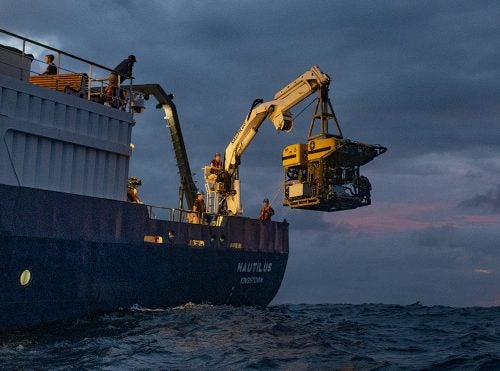NOAA-funded applied research to deliver foundational knowledge for healthy, sustainable growth of blue economies.
The National Oceanic and Atmospheric Administration (NOAA) has formed two new institutes for oceanographic exploration, collaborative research and discovery. The Ocean Exploration Cooperative Institute (OECI) will be hosted by URI/GSO at the Narragansett Bay Campus. GSO will also join the Cooperative Institute for the North Atlantic Region (CINAR) led by the Woods Hole Oceanographic Institution (WHOI). Both cooperative institutes comprise the talents and expertise of several member universities and research enterprises.

Oceanography Tomorrow
Near Nikumaroro island in the Pacific Ocean, E/V Nautilus deploys the remotely operated vehicle, Hercules. Robotics technology like this will be used extensively to further map and characterize the nearly three billion acres of submerged territory in the U.S. Exclusive Economic Zone.
The Next Lewis and Clark Expedition
OECI—a collaboration among five internationally renowned ocean science institutions working in concert with NOAA’s Office of Ocean Exploration and Research (OER)—has set an ambitious goal: to map and characterize the nearly three billion acres of territorial waters, known as the U.S. Exclusive Economic Zone (EEZ) by 2030.
“U.S. territorial waters cover more ocean than that of almost any other country on Earth. Imagine we’re about to lead the next Lewis and Clark expedition, only six times over,” said OECI’s lead principal investigator, GSO professor Robert Ballard. “When we’re done, we’ll know what we have.”
Retired Navy Rear Admiral Tim Gallaudet, assistant secretary of commerce for oceans and atmosphere and deputy NOAA administrator observed: “The Blue Economy is expected to more than double its contribution to the U.S. economy and employ 40 million people by 2030. It will rely on data and information to formulate science-based management and sustainable use of our oceans in support of economic growth, food security and our national security.”
Rhode Island Senator Sheldon Whitehouse, who worked for years to secure significant investment in NOAA’s Cooperative Institute program, said that he was “glad those efforts have led to this landmark investment in Rhode Island’s blue economy.”
OECI will also foster innovation to help oceanographers transition to next-generation technologies deployed from a wide array of oceanographic vessels, including robotic and remotely controlled underwater vehicles. Innovations, coupled with existing infrastructure and talents, “will lead to important discoveries and surveys as researchers more efficiently explore, collaborate and map submerged U.S. territory and deepwater habitats,” noted R.I. Senator Jack Reed.
“But,” said Ballard, “the future of ocean exploration will remain a human endeavor. We need the visionaries who develop ideas and new ways of exploring, engineers who make those ideas a reality, operators of the technology, and skilled communicators and educators who can explain the importance of these discoveries and inspire people around the world.”
GSO tapped to join CINAR
CINAR will focus on decisions for sustainable and beneficial management of the U.S. Northeast continental shelf—a critical ecosystem that extends from Maine to Virginia.
“CINAR’s mission is to provide a better understanding of the physical, biological, and chemical processes that enable forecasting conditions within the North Atlantic region as a tool for effective, ecosystem-based management and protected-species management,” said CINAR director Don Anderson.
The institute’s research will focus on five major areas that align with NOAA scientific research:
- Sustained Ocean Observations and Climate Research
- Ecosystem Research, Observation, and Modeling
- Stock Assessment Research
- Protected Species Research and Recovery
- Ecosystem-Based Fisheries Management
“The research will strengthen our nation’s blue economy, which depends on data and information to make sound decisions for a healthy ecosystem and strong economy,” said Craig McLean, assistant NOAA administrator for Oceanic and Atmospheric Research.
GSO Dean Bruce Corliss added: “We look forward to continuing our support of NOAA’s efforts in fisheries and coastal resilience in the New England coastal ecosystem with our partners over the next five years.”
